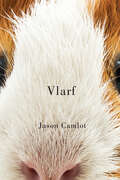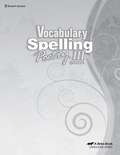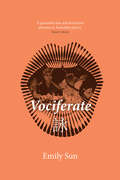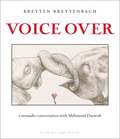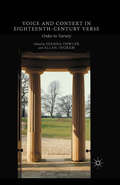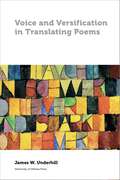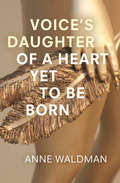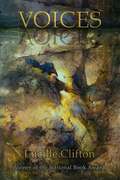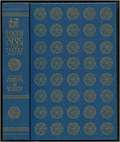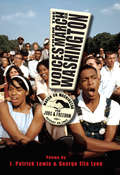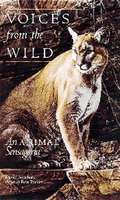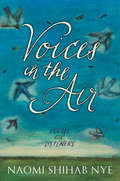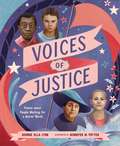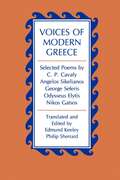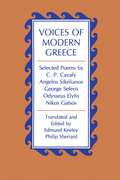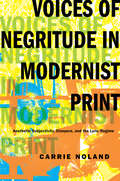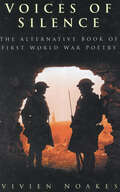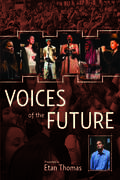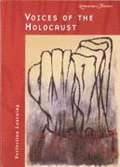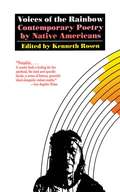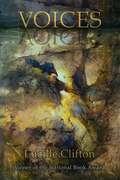- Table View
- List View
Vlarf (Hugh MacLennan Poetry Series #66)
by Jason CamlotHolmes entered the cabinet / of the respectable reverend / (who was in fact a closet naturalist) / and found so many Victorian things.In the early 2000s flarf poetry emerged as an avant-garde movement that generated disturbing and amusing texts from the results of odd internet searches. In Vlarf Jason Camlot plumbs the canon of Victorian literature, as one would search the internet, to fashion strange, sad, and funny forms and feelings in poetry.Vlarf pursues expressions of sentiment that may have become unfamiliar, unacceptable, or uncool since the advent of modernism by mining Victorian texts and generic forms with odd inclinations, using techniques that include erasure, bout-rimé, emulation, adaptation, reboot, mimicry, abhorrence, cringe, and love. Erasures of massive volumes of prose by John Stuart Mill and John Ruskin become concise poems of condensed sadness; a reboot of Christina Rossetti’s “Goblin Market” is told from the perspective of a ten-year-old boy with an imaginary albatross pal; recovered fragments from an apocryphal book of Victorian nonsense verse are pieced together; a Leonard Cohen song about Queen Victoria is offered in a steampunk rendering; and a meditative guinea pig delivers a dramatic monologue in the vein of Robert Browning.Camlot moves through Victorian literature as a collector in a curiosity shop, seeking the oddest forms of feeling in language to shape them into peculiarly affective poems.
Vocabulary, Spelling, Poetry
by Ed. D. James A. ChapmanStimulate your child's analytical and memorization skills with Vocabulary, Spelling, Poetry V. This text puts an emphasis on the origin of vocabulary words; word analysis through the study of prefixes, roots, and suffixes; word analogies; synonyms and antonyms; and classic poetry. <p><p>This text is broken down into 12 units; each unit includes 12 vocabulary words, 2 sets of 15 spelling words, a list of prefixes, roots, and suffixes; and 5 word exercises to help implement new concepts. Nine well-known poems are also included for recitation and memorization to enhance the appreciation of poetry.
Vocabulary, Spelling, Poetry III Quizzes
by Calyn Ohman Sarah EshlemanPerceptions are important. When we misspell or misuse a word, others perceive us as being careless or lacking education. Give your homeschooler the reinforcement he needs to represent both his training and his Savior well with these prepared spelling and vocabulary quizzes. The quiz book is correlated with the text Vocabulary, Spelling, Poetry III, 5th ed., and the Homeschool English 9 Parent Guide/Student Daily Lessons, which calls for spelling and vocabulary study for seven of the nine weeks of each quarter. Answers and grading instructions are sold separately in the Vocabulary, Spelling, Poetry III Quiz Key. Grade 9. <p><p> Product Features<p> · Both spelling and vocabulary words are quizzed in a variety of ways such as dictation, recognition of misspelled words, application of spelling rules, and choosing the correct vocabulary word for the definition or context. The variety of formats both within quizzes and from quiz to quiz allows you to evaluate whether your teen truly has an understanding of the words.<br> · The 28 weekly quizzes include additional review words from the previous two lessons to give extra reinforcement to your teen’s learning.<br> · The 4 quarterly review quizzes are cumulative over the entire quarter or semester. This continued exposure to the words builds your ninth grader’s comfort and confidence in spelling the words, applying spelling rules to other words he encounters, and using the vocabulary words in his own speech and writing.
Vociferate
by Emily SunThe poems in Emily Sun's debut poetry collection Vociferate were inspired by diasporic-Asian feminist writers. Like these writers, Emily resists both Eurocentric and patriarchal tropes as she explores the complexities of national and transnational identities, reflects upon the concept of belonging, and questions what it means to be Asian-Australian.
Voice Over: a nomadic conversation with Mahmoud Darwish
by Breyten BreytenbachMahmoud Darwish, the Palestinian poet (1941 - 9 August 2008), was a friend. I was on Gorée Island when I learned of his death during the course of an open-heart intervention in Houston, America. We had been together a few weeks earlier in Arles, the south of France. Even at noon the foyer of the hotel where we stayed was as if drained of light by dusk. He knew how serious his condition was - it was either the very risky operation or the possibility of dying at any moment from an exploding aorta - and with an ironic smile he speculated about his chances of survival. That night, as the sun was setting in a yellow flood over the ancient open air Roman theater and as birds began singing the accumulated sweetness of a summer's day, he publicly read one last time from his work. The poems were shot through by an ongoing conversation with death. Immediately after his passing, I started writing the above series as fragments of a continuing dialogue. In West Africa it was then the onset of the rainy season moving north, the 'petit hivernage,' when black-blue clouds would skitter and close the skies. . . .The journey continues and the conversation will carry on, in the attempt to look for Mahmoud Darwish among the words.Breyten BreytenbachNew York, December 2008
Voice and Context in Eighteenth-Century Verse: Order in Variety
by Allan Ingram Joanna FowlerThis collection of essays reassesses the importance of verse as a medium in the long eighteenth century, and as an invitation for readers to explore many of the less familiar figures dealt with, alongside the received names of the standard criticism of the period.
Voice and Versification in Translating Poems (Perspectives on Translation)
by James W. UnderhillGreat poets like Shelley and Goethe have made the claim that translating poems is impossible. And yet, poems are translated; not only that, but the metrical systems of English, French, Italian, German, Russian and Czech have been shaped by the translation of poems. Our poetic traditions are inspired by translations of Homer, Dante, Goethe and Baudelaire. How can we explain this paradox? James W. Underhill responds by offering an informed account of meter, rhythm, rhyme, and versification. But more than that, the author stresses that what is important in the poem—and what must be preserved in the translated poem—is the voice that emerges in the versification. Underhill’s book draws on the author’s translation experience from French, Czech and German. His comparative analysis of the versifications of French and English have enabled him to revise the key terms involved in translating the poetic voice and transposing the poem’s versification. The theories of versification from the Prague School of Linguistics, the French and Swiss schools of versification, and recent scholarship in metrics and rhythm in the UK and in the USA have been integrated into this synthetic but rigorously coherent approach to translating poems. The extensive glossary at the end of the book will prove useful for both students and teachers alike. And the detailed case studies on translating poems by Baudelaire and Emily Dickinson allow the author to categorize and appraise the various poetic and aesthetic strategies and theories that are brought to bear in translating Baudelaire into English, and Dickinson into French. Published in English.
Voice's Daughter of a Heart Yet To Be Born
by Anne WaldmanComing in the wake of her vast and magnificent epic (The Iovis Trilogy: Colors in the Mechanism of Concealment), this volume brings Anne Waldman’s work into the more intimate, paradoxical folds of poetic (and prophetic) knowledge. This should not suggest that Voice's Daughter of a Heart Yet to Be Born is a book of small things; it is anything but. Juxtaposing lyric arcana, journalism, critical fragments, visions of mythic and mystic beings, narrative, polemics, and even ekphrasis, Waldman has created a work that is simultaneously jeremiad and psalm. It is, then, both fearful and celebratory, an epic of a ‘time before birth.’
Voices (American Poets Continuum (paperback) Ser. #112.00)
by Lucille CliftonIn 2007, Lucille Clifton became the first African American woman to win the Ruth Lilly Poetry Prize, one of the most prestigious American poetry awards and one of the largest literary honors for work in the English language. Clifton has also won the National Book Award in poetry for Blessing the Boats (BOA Editions, 2000), and is the only author ever to have two collections, Good Woman: Poems and a Memoir (BOA Editions, 1987) and Next: New Poems (BOA Editions, 1987), named finalists for the Pulitzer Prize in one year. In Voices, Clifton continues her celebrated aesthetic of writing poems for the disempowered and the underprivileged while finding humor and redemption among life’s many hardships. This book also highlights Clifton’s ability to write inventive dramatic monologues. Voices includes monologues spoken by animals, as well as by the food product spokespeople Aunt Jemima, Uncle Ben, and the apparently nameless guy on the Cream of Wheat box.
Voices Within the Ark: The Modern Jewish Poets
by Howard Schwartz Anthony RudolfThis anthology gathers together in one volume representative selections of the finest poetry written by Jewish poets since the turn of the century.
Voices from Bengal: Modern Bengali Poetry in English Translation
by Manabendra Bandy Opadhyay Sukanta Chaudhuri Swapan MajumdarThe purpose of this anthology is to convey the range, variety and complexity of Bengali poetry from the generation following Tagore to the present.
Voices from the March on Washington
by George Ella Lyon J. Patrick LewisThe powerful poems in this poignant collection weave together multiple voices to tell the story of the March on Washington, DC, in 1963. From the woman singing through a terrifying bus ride to DC, to the teenager who came partly because his father told him, "Don't you dare go to that march," to the young child riding above the crowd on her father's shoulders, each voice brings a unique perspective to this tale. <P><P> As the characters tell their personal stories of this historic day, their chorus plunges readers into the experience of being at the march--walking shoulder-to-shoulder with strangers, hearing Martin Luther King Jr.'s famous speech, heading home inspired.
Voices from the Wild: An Animal Sensagoria
by David BouchardA collection of poems, each one focusing on an animal in the wild and the sense (sight, smell, touch, hearing, or taste) most important to its survival. For children.
Voices in the Air: Poems for Listeners
by Naomi Shihab Nye<p>Acclaimed and award-winning poet, teacher, and National Book Award finalist Naomi Shihab Nye’s uncommon and unforgettable voice offers readers peace, humor, inspiration, and solace. This volume of almost one hundred original poems is a stunning and engaging tribute to the diverse voices past and present that comfort us, compel us, lead us, and give us hope. <p>Voices in the Air is a collection of almost one hundred original poems written by the award-winning poet Naomi Shihab Nye in honor of the artists, writers, poets, historical figures, ordinary people, and diverse luminaries from past and present who have inspired her. Full of words of encouragement, solace, and hope, this collection offers a message of peace and empathy. <p>Voices in the Air celebrates the inspirational people who strengthen and motivate us to create, to open our hearts, and to live rewarding and graceful lives. With short informational bios about the influential figures behind each poem, and a transcendent introduction by the poet, this is a collection to cherish, read again and again, and share with others. </p>
Voices of Ireland: Classical Writings from a Rich and Rare Land
by Malachy MccourtContents Jonathan Swift (1667-1745) A Modest Proposal; Maria Edgeworth (1767-1849) Castle Rackrent; William Carleton (1794-1869) Traits and Stories of the Irish Peasantry; Joseph Sheridan LeFanu (1814-1873) Uncle Silas; Alice Stopford Green (1847-1929) Ourselves Alone in Ulster; Lady Gregory (1852-1932) Selections from Irish Myths and Legends; Oscar Wilde (1854-1900) The Ballad of Reading Gaol and Other Poems; William Butler Yeats (1865-1939) Early Poems; John Millington Synge (1871-1909) The Playboy of the Western World; James Joyce (1882-1941) Dubliners; James Stephens (1882-1950) The Insurrection in Dublin; Michael Collins (1890-1922) Selected Works.
Voices of Justice: Poems about People Working for a Better World (Who Did It First?)
by George Ella LyonA bold, lyrical collection of poems that highlight some of the most celebrated activists from around the world and throughout history.In the face of injustice, the world has always looked to brave individuals to speak up and spark change. Nelson Mandela used his voice to bring down Apartheid. Jane Goodall, Dian Fossey, and Birutè Galdikas gave a voice to the primates who couldn’t speak for themselves. The Women of Greenham Common used their collective voice to fight against preparations for nuclear war. And today’s youth—like Xiuhtezcatl Martinez, the students of Stoneman Douglas High School, and Greta Thunberg—unite their voices to stop gun violence, save the planet, and so much more.Through enlightening poems by award-winning poet and author George Ella Lyon and stunning portraits by artist Jennifer M. Potter, Voices of Justice introduces young readers to the groundbreaking work of people who fought—and continue to fight—to make the world a better place.Featuring those mentioned above along with Virginia Woolf, Dolores Huerta, Shirley Chisholm, Jasilyn Charger, Jeannette Rankin, and more, each portrait offers a vision of action and love that gets up and does something, no matter the forces ranged against it, no matter the odds.
Voices of Modern Greece: Selected Poems by C. P. Cavafy, Angelos Sikelianos, George Seferis, Odysseus Elytis, Nikos Gatsos
by Edmund Keeley Philip SherrardThis anthology is composed of recently revised translations selected from the five volumes of work by major poets of modern Greece offered by Edmund Keeley and Philip Sherrard during the past two decades. The poems chosen are those that translate most successfully into English and that are also representative of the best work of the original poets. <P><P> C. P. Cavafy and Angelos Sikelianos are major poets of the first half of the twentieth century. George Seferis and Odysseus Elytis, who followed them, both won the Nobel Prize in literature. Nikos Gatsos is a very popular translator, lyricist, and critic.
Voices of Modern Greece: Selected Poems by C.P. Cavafy, Angelos Sikelianos, George Seferis, Odysseus Elytis, Nikos Gatsos
by Edmund Keeley Philip SherrardThis anthology is composed of recently revised translations selected from the five volumes of work by major poets of modern Greece offered by Edmund Keeley and Philip Sherrard during the past two decades. The poems chosen are those that translate most successfully into English and that are also representative of the best work of the original poets. C. P. Cavafy and Angelos Sikelianos are major poets of the first half of the twentieth century. George Seferis and Odysseus Elytis, who followed them, both won the Nobel Prize in literature. Nikos Gatsos is a very popular translator, lyricist, and critic.
Voices of Negritude in Modernist Print
by Carrie NolandApproaches Negritude as an experimental, text-based poetic movement developed by diasporic authors of African descent through the means of modernist print culture
Voices of Negritude in Modernist Print: Aesthetic Subjectivity, Diaspora, and the Lyric Regime (Modernist Latitudes)
by Carrie NolandCarrie Noland approaches Negritude as an experimental, text-based poetic movement developed by diasporic authors of African descent through the means of modernist print culture. Engaging primarily the works of Aimé Césaire and Léon-Gontran Damas, Noland shows how the demands of print culture alter the personal voice of each author, transforming an empirical subjectivity into a hybrid, textual entity that she names, after Theodor Adorno, an "aesthetic subjectivity." This aesthetic subjectivity, transmitted by the words on the page, must be actualized—performed, reiterated, and created anew—by each reader, at each occasion of reading. Lyric writing and lyric reading therefore attenuate the link between author and phenomenalized voice. Yet the Negritude poem insists upon its connection to lived experience even as it emphasizes its printed form. Ironically, a purely formalist reading would have to ignore the ways formal—and not merely thematic—elements point toward the poem's own conditions of emergence. Blending archival research on the historical context of Negritude with theories of the lyric "voice," Noland argues that Negritude poems present a challenge to both form-based (deconstructive) theories and identity-based theories of poetic representation. Through close readings, she reveals that the racialization of the author places pressure on a lyric regime of interpretation, obliging us to reconceptualize the relation of author to text in poetries of the first person.
Voices of Silence: The Alternative Book of First World War Poetry
by Vivien NoakesThe poetry of the First World War has determined our perception of the war itself. This volume features poetry drawn from old newspapers and journals, trench and hospital magazines, individual volumes of verse, gift books, postcards, and a manuscript magazine put together by conscientious objectors.
Voices of the Future
by Etan Thomas"The poetic voice of his generation."-Kareem Abdul-Jabbar"Etan Thomas is breaking it down for our young minds on how to be a vital part of this challenging world we all live in. Let's give it up for Etan."-Spike LeeBroken down by a variety of subject matter, each section begins with a selection from an interview between NBA star Etan Thomas and political sportswriter Dave Zirin, followed by a Thomas poem and the writings of talented young poets.Etan Thomas is an author, columnist, and the recipient of the 2010 National Basketball Players Association Community Contribution Award.
Voices of the Holocaust
by Literature Thought SeriesContains short stories, poems, biographical accounts, and essays about the Holocaust intended to help readers answer the question: Could a holocaust happen here?
Voices of the Rainbow: Contemporary Poetry by Native Americans
by Kenneth RosenKenneth Rosen's haunting volume of poetry proves that the powerful and moving voice of Native Americans must be heard. More than two hundred poems embrace anguish, pride, and hope, representing twenty-four tribal affiliations, including, Sioux, Pawnee, Choctaw, Seminole, Laguna Pueblo, Cherokee, Anishinabe, Mohawk, Seneca, and Seminole. An Indian leader once asked a U.S. president: "What visions, under the white man's way, are offered that will cause today's children to want tomorrow to come?" In a sense, each poem in this volume is an attempt to confront and answer that very question.
Voices: Poems
by Lucille CliftonIn 2007, Lucille Clifton became the first African American woman to win the Ruth Lilly Poetry Prize, one of the most prestigious American poetry awards and one of the largest literary honors for work in the English language. Clifton has also won the National Book Award in poetry for Blessing the Boats (BOA Editions, 2000), and is the only author ever to have two collections,Good Woman: Poems and a Memoir (BOA Editions, 1987) and Next: New Poems (BOA Editions, 1987), named finalists for the Pulitzer Prize in one year. In Voices, Clifton continues her celebrated aesthetic of writing poems for the disempowered and the underprivileged while finding humor and redemption among life's many hardships. This book also highlights Clifton's ability to write inventive dramatic monologues. Voices includes monologues spoken by animals, as well as by the food product spokespeople Aunt Jemima, Uncle Ben, and the apparently nameless guy on the Cream of Wheat box.
